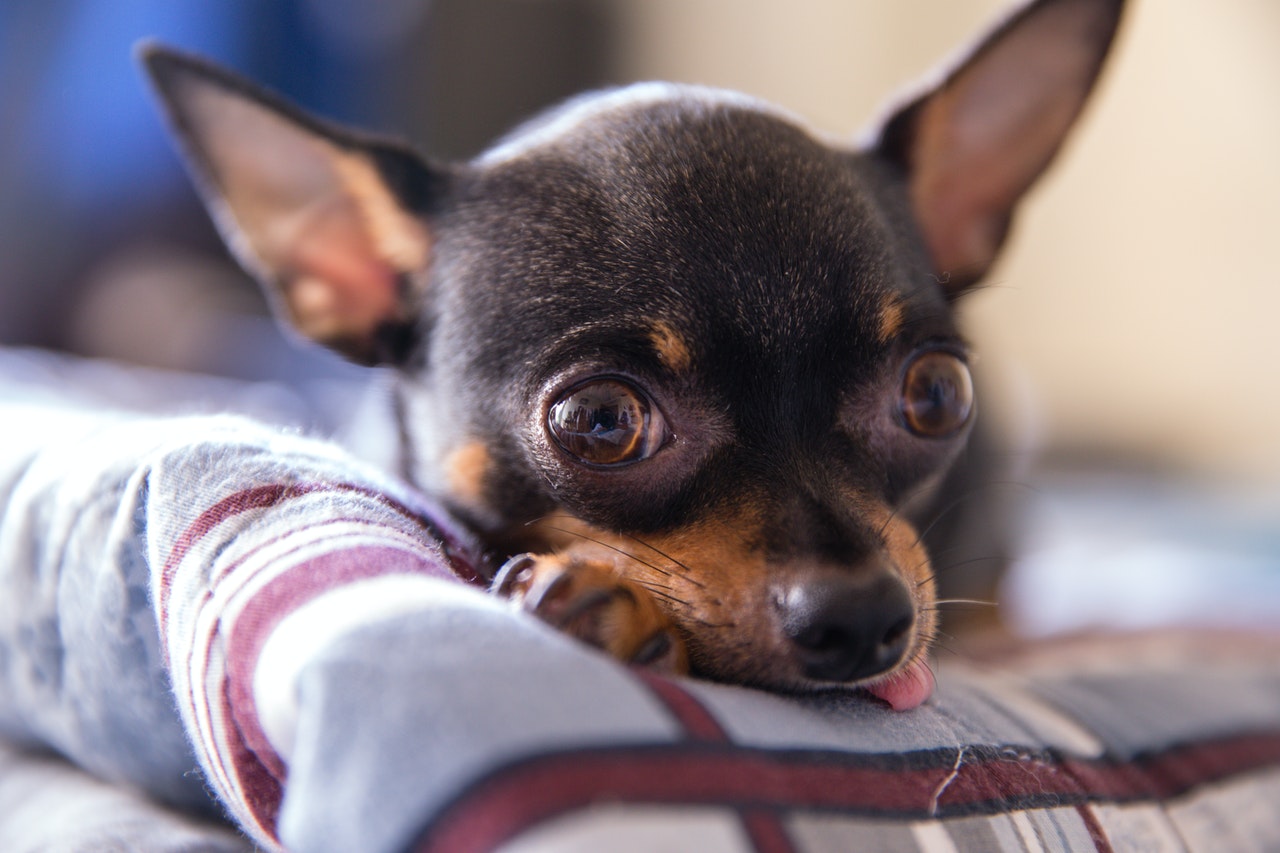Are you having problems with what to give your chihuahua for constipation? Chihuahua constipation can strike any time and disappear as quickly as it appears. It could happen for various reasons and is typically easy to address, but some chihuahuas may develop persistent constipation problems. It may cause constipation, in which the stool is compact, tougher, and drier until the chihuahua is unable to defecate.
You can do a few things to help with constipation, and this guide will go over what you can give your chihuahua for constipation.
Why Do Chihuahuas Get Constipation?

The food gets into your chihuahuas’ digestive system after they consume it. The large, small, and stomach are the primary organs associated with digestion or the colon.
The colon is among the final stages of digestion. It collects chyme (a pile of partially digested fluids and foods) from the small intestine. Subsequently, it accumulates water and electrolytes from the bulk as the excrement moves through the rectum. The rhythmic activity and Natural lubrication of the intestine help push feces towards the rectum.
The colon would continue to process the water and salts from the feces when it moves slowly. As a result, your chihuahua’s feces grow drier and smaller. Making it even more difficult for the colon to push them further, leading to constipation.
Possible Causes of Chihuahua Constipation
Before knowing what to give a chihuahua for constipation, you must know what causes constipation. There are many potential causes of Chihuahua constipation, but the most common include:
➧Dehydration
Dehydration is a common cause of constipation. If your chihuahua isn’t drinking enough water, its colon will absorb too much water from the feces, making it difficult to pass. However, this small type of dog doesn’t require much water (dogs require about 8 ounces each for every 10 pounds of body weight.
A Chihuahua can suffer from dehydration if it does not consume enough fluids or loses fluids too quickly. Also, if you switch your chihuahuas’ food from wet to dry food. Which causes it to consume less water than usual.
➧Poor Diet
A diet that lacks fiber can lead to constipation. Soluble dietary fiber is found in fruits, vegetables, and whole grains. It dissolves in water and forms a gel-like substance. This substance helps add bulk to the stool and softens it, so it’s easier to pass. So, selecting the best dog food and maintaining a constant diet to prevent constipation is critical.
➧Lack of Exercise
Exercise is essential for all dogs, including chihuahuas. It helps stimulate the intestines and keeps everything moving along smoothly. A lack of exercise can cause your chihuahua to become obese, leading to constipation. However, if your chihuahua prefers a sedentary lifestyle, sudden increases in activity can also lead to constipation.
➧Changes in Environment or Schedule
Changes in routine can often lead to stress, which can have a negative impact on the digestive system. If you’ve recently moved or made changes to your chihuahua’s schedule, it may be constipated.
➧Consuming Foreign Objects
Chihuahuas are curious creatures and often put things in their mouths that they shouldn’t. If your chihuahua has consumed a foreign object, it could be causing constipation. Common objects that can cause constipation include sticks, bones, rocks, and toys.
➧Age-Related Issue
As chihuahuas age, they often suffer from constipation. It is due to a decrease in muscle tone and a change in diet. If your chihuahua is getting older, you may want to switch to senior formula dog food.
Signs and Symptoms of Chihuahua Constipation

There are a few signs and symptoms that you can look for to determine if your chihuahua is suffering from constipation. These include:
🐾Straining to Defecate
If your chihuahua is straining to defecate, it may be a sign of constipation. It is often accompanied by whimpering or whining. Chihuahuas can keep their poop for a long period. Don’t panic if you haven’t seen your chihuahua poop in 24 hours; however, keep a close watch on it. Your chihuahua might be suffering from constipation if it goes more than 48 hours without defecating.
🐾Dry, Hard Stools
If your chihuahua’s stool is dry and hard, it is an indication of constipation. It is because the colon has absorbed too much water from the feces. If this occurs, keep a close eye on your chihuahua to see whether the condition improves or worsens.
🐾Decreased Appetite
If your chihuahua has a decreased appetite, it may be a sign of constipation. When the intestines are blocked, it can cause a decrease in appetite. If you notice that your chihuahua is eating less than usual, take it to the vet to rule out other potential health problems.
🐾Painful Defecation
It might be constipated if your chihuahua was in pain when it defecated. This is often accompanied by straining, whimpering, or whining. If you notice that your chihuahua is in pain when pooping, take it to the vet as soon as possible.
🐾Discomfort
If your chihuahua is restless and seems uncomfortable, it might indicate constipation. If you notice your chihuahua pacing or panting more than usual, take it to the vet to rule out other potential health problems.
🐾Bloody Stool
A bloody stool is quite alarming, but it’s not always a cause for concern. If your chihuahua has a bloody stool, it is a sign of constipation. However, bloody stool can also be a sign of other health problems.
🐾Mucus In Stool
The intestines produce mucus to lubricate the stool and make it easier to pass. However, if there’s too much mucus in the stool, it might be a sign of constipation. If you notice that your chihuahua’s stool is unusually slimy, take it to the vet.
🐾Anus Has Matted Fur
If the fur around your chihuahua’s anus is matted, it might be a sign of constipation. When a chihuahua is constipated, it often drags its bottom along the ground to relieve the discomfort. It can cause the fur around the anus to become matted. If you notice that the fur around your chihuahua’s anus is matted, check to see if there’s any stool stuck in the fur. You can gently remove it and give your chihuahua a bath.
However, if you notice these signs or symptoms in your chihuahua, take it to the vet as soon as possible. Constipation can often be resolved with simple home remedies, but in some cases, medical intervention may be necessary.
Home Remedies to Give Chihuahua for Constipation

Perhaps, you have confirmed your chihuahua for constipation. And you want to alleviate your chihuahua’s constipation with home remedies before taking it to the vet.
Note: Home remedies should only be used to treat mild constipation. If your chihuahua is showing any signs of severe constipation, take it to the vet immediately.
Now, here are some simple home remedies that you can try to relieve your chihuahua’s constipation:
✔Feed Your Chihuahua More Fiber
As mentioned above, fiber is essential for proper digestion. If your chihuahua is constipated, increase its intake of fiber-rich foods. It will help to soften the stool and make it easier to pass. This can be done by adding canned pumpkin or bran cereal to your chihuahua’s food.
Pumpkin is rich in water contents and a good provider of fiber, and you could use canned pumpkin puree or fresh pumpkin puree. There are many recipes for pumpkins you can find online. The extra fiber will help bulk up the stool and make it easier to pass.
✔Give Your Chihuahua Plenty of Water
Water is essential for proper digestion. If your chihuahua is constipated, ensure it’s getting plenty of water. It will help to soften the stool and make it easier to pass. Try to increase your chihuahua’s water intake by adding a little water to its food. You can also add some chicken broth to its water bowl. The extra fluid will help hydrate your chihuahua and make the stool easier to pass.
✔Mix Canned Food into Their Meal
If your chihuahua is constipated, you can try adding some canned food to its diet. Canned food is usually high in water content and can help soften the stool. This will make it easier for your chihuahua to pass stool. You can mix canned food into your chihuahua’s dry food or feed it canned food alone.
✔Natural Supplements
Natural fiber supplements can assist in making the stool soft and control bowel movement by increasing fiber in the body. Consult with your vet about particular supplement dosage and brands for your chihuahua. Vegetable enzymes, folic acid, and acidophilus are common additives in these products.
✔Probiotics
There are probiotics for dogs that you can purchase from your local pet store. Probiotics are live microorganisms that help to promote healthy gut flora. It can help improve your chihuahua’s digestion and make it easier to pass stool.
✔Exercise
Exercise is essential for all dogs, but it’s especially important for constipated dogs. Exercise helps to stimulate the digestive system and can help to move the stool along. Take your chihuahua for a walk or fetch it in the backyard. Just make sure that you don’t overdo it. Too much exercise can make constipation worse.
✔Give Your Chihuahua a Massage
Sometimes, all your chihuahua needs is a little bit of TLC. A gentle massage can help to stimulate the digestive system and relieve constipation. Just rub your chihuahua’s tummy in a clockwise direction. It will help move the stool along and make it easier for your chihuahua to pass.
✔Laxatives and Enemas
If home remedies don’t work, your vet may recommend giving your chihuahua a laxative or enema. These are safe and effective treatments for constipation. However, they should only be used as a last resort.
✔Mineral Oil
Mineral oil is a lubricant that can help to soften the stool. It’s safe to give your chihuahua mineral oil but consult your vet first. They will be able to tell you how much mineral oil to give your chihuahua based on its weight.
✔Aloe Ferox
Aloe Ferox is a natural system remedy and cleanser with a positive effect on digestion. It is rich in enzymes, vitamins, minerals, and amino acids. It can help to cleanse the digestive system and relieve constipation.
Diagnosing Chihuahua Constipation
If your chihuahua is constipated, it’s important to seek veterinary care. Your vet can diagnose the cause of your chihuahua’s constipation and recommend the best course of treatment. In some cases, constipation can be a sign of a more serious underlying health condition.
A physical examination, such as rectal palpation, will be conducted by your vet during your appointment. They will also take a complete medical history and ask about your chihuahua’s diet, exercise, and bathroom habits. Your vet may also recommend some diagnostic tests such as:
- Neurological exam
- Urinalysis
- Complete Blood Count
- Colonoscopy or Ultrasound
- Barium enema
- Abdominal area Radiographs
- Rectal exam
- Abdominal palpation
They will probably be able to spot if your chihuahua has constipation based on the examination and your medical history. These tests can help to rule out any other potential health problems.
Treating Chihuahua Constipation
Once your vet has diagnosed your chihuahua with constipation, they will recommend the best course of treatment. Treatment will vary depending on the underlying cause of constipation. In most cases, treatment will focus on relieving constipation and preventing it from happening again in the future.
Your veterinarian may suggest treatments or changes if your chihuahua has persistent or chronic constipation. Aside from the low-residue diet, here are some possible treatments:
▷Manual Colon Removal
This treatment is done by your veterinarian and requires sedation. A gloved, lubricated finger is inserted into the rectum and manually breaks up the stool so it can be expressed.
▷Enzyme-Blocking Treatment
This treatment involves giving your chihuahua a medication that will block the absorption of enzymes in the intestine. It decreases the amount of water absorbed by the stool, making it softer and easier to pass.
▷Nerve-stimulating Treatment
It is a medication that involves giving your chihuahua a medication that will stimulate the nerves in the intestine. It increases muscle contractions and helps to move the stool along.
▷Surgery
Surgery may sometimes be necessary to remove the intestinal blockage or correct anatomical abnormalities. Your veterinarian will discuss this option with you if they feel it is necessary.
Preventing Chihuahua Constipation
Constipation might be quite painful for your chihuahua, and treatment may require an appointment with the veterinarian, so it’s better to prevent it from happening in the first place. Here are some tips to help prevent constipation:
❕Puppy Proof Your House
Regardless matter how old your chihuahua is, puppy-proof your home. Chihuahuas of all ages are susceptible to swallowing and mouthing non-food things, even if they have never shown any interest beforehand.
The best way to keep your Chihuahua safe is to put away anything that could potentially be swallowed or chewed on, such as children’s toys, coins, small household items, etc. Also, don’t give your chihuahua any raw bones, as these can splinter and cause intestinal blockages.
❕Monitor Your Chihuahua’s Stool
Keep a close eye on your chihuahua’s feces consistency and frequency. Healthy stools should be soft and easy to pass. Contact your veterinarian if you notice any changes in your chihuahua’s stool, such as hard or dry stools, decreased frequency, or straining to defecate.
❕Daily Exercise is Important
Daily exercise is important for all dogs, but especially for those that are prone to canine constipation. Exercise helps to stimulate the digestive system and can help prevent or relieve constipation. Exercise and a healthy diet can also help your chihuahua maintain a healthy weight, which is important for preventing constipation.
❕Regular Grooming
Keep the fur surrounding the anus short, and groom your chihuahua on a regular basis. It will help keep the area clean and free of potential blockages.
Frequently Asked Questions
1. What can you give your chihuahua for constipation?
You can do a few things to help relieve constipation in your chihuahua. Give them plenty of fresh water, exercise, and a high-fiber diet. You can also give them stool softeners or other medications as your veterinarian recommends.
2. When should you worry about chihuahua constipation?
You should contact your veterinarian if your chihuahua is straining to defecate, has hard or dry stools, or if they are constipated for more than a few days. Also, when your chihuahua seems to lose appetite, vomits, or has a distended abdomen, these could be signs of a more serious problem, and you should seek veterinary care immediately.
3. What are the long-term effects of constipation in chihuahuas?
If left untreated, constipation can lead to more serious problems such as megacolon (enlargement of the colon) or intestinal blockages. These conditions can be life-threatening and require surgery. Constipation can also cause your chihuahua to become dehydrated, so you must contact your veterinarian if you think your chihuahua is constipated.
4. Can you give your chihuahua human stool softener?
You should not give your chihuahua human stool softeners without discussing them with your veterinarian. Some human stool softeners can be toxic to dogs and cause more serious problems. Your veterinarian can recommend a safe and effective stool softener for your chihuahua.
5. Can milk help chihuahuas with constipation?
Milk can help relieve constipation in some dogs, but it can also cause diarrhea. If you give your chihuahua milk, make sure it is plain, whole milk without added sugars or flavorings. You should only give a small amount as too much milk can lead to diarrhea.
6. What is the best food for a chihuahua with constipation?
A high-fiber diet is the best food for a chihuahua with constipation. You can add fiber to your chihuahua’s diet by feeding them canned pumpkin, bran flakes, or other high-fiber foods. You should also ensure they get plenty of exercises and fresh water.
Final Thoughts
If your chihuahua is constipated, there are a few things you give your chihuahua for constipation. Following the tips in this article can help relieve constipation and keep your chihuahua healthy. Remember to contact your veterinarian if constipation persists or if your chihuahua seems to be in pain. With proper care, your chihuahua will return to normal in no time!
Here at ILoveChihuahua, we share our personal experiences as owners of this feisty breed. We talk about recommended methods, dog supplies picks, and advice on common Chihuahua problems. Our goal is to promote responsible dog ownership, so there would be fewer Chihuahuas in shelters.


